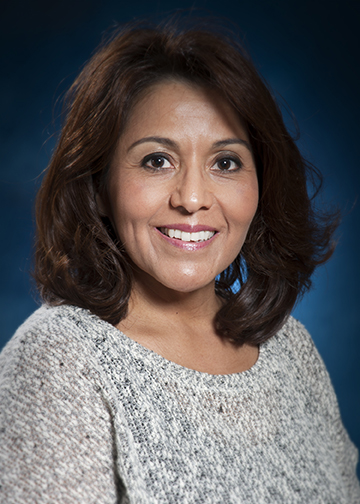
Profiles in Leadership

Norma Jimenez
Administrative Secretary, Crystal M. Lange College of Health & Human Services
1. What is your name and profession?
Norma Jimenez
Administrative Secretary to the Dean, Crystal M. Lange College of Health & Human Services
2. What does Women’s History Month mean to you?
It is an opportunity to recognize and appreciate the women before us that have paved the way to creating change and opportunities for women.
3. As a woman, in what ways have you struggled to get to where you are today and how did you overcome those struggles?
Realizing that I am not alone and that others may be going through similar situations. It is important to lift others up and help them accomplish their goals. Additionally, we may not always be successful but knowing that you gave it your best shot and how you can improve and do things differently, or better, are important traits to learn and grow from. If you make a mistake, own it, and learn from it. How you overcome can be a wonderful learning experience.
4. What advice do you have for young women who are aspiring to follow their dreams?
We can learn so much from others. Everyone has a story. It is important to meet new people. While at a business function or event, do not be afraid to introduce yourself to those you don’t know. Getting to know new professionals can open doors and opportunities. Additionally, let your passion shine and always be your true self. It is equally important to share your knowledge and to help others grow personally and professionally.
5. As a woman in your position, how have you fought for equity in the workplace and for other women?
I always do my best to create an environment of inclusiveness and try to see the whole picture. Change can be difficult for some people. I am comfortable with using my voice, influential skills, professional strengths and skillsets to help streamline less efficient processes to create new and innovative processes to benefit the team.
6. Who was your role model and how did they change your life?
My parents – they taught me to never take people for granted, to appreciate others, and to never give up. They taught me to believe in myself even when life knocks me down, to get back up, learn, keep moving forward and growing, and to learn from mistakes. Additionally, a former manager took me under his wing and shared that it is important to never forget where you came from and what you were able to accomplish to get you to where you are today. It is important to always remember that your accomplishments were not always yours alone. Do not take others for granted.
7. If you could have dinner with any woman figure (dead or alive), who would you choose and why?
Felicitas Mendez – In 1944, a public school in California refused to enroll her children because of their ethnicity. In 1946, Felicitas Mendez, her husband, and other families, led an educational civil rights desegregation case known as Mendez v. Westminster. This case paved the way for integration and public-school reform. Felicitas organized committees and fought to end segregation of Hispanic students. The courts ultimately ruled in favor of the Mendez family and other parents. It would be an honor to have a conversation with Mrs. Mendez and to learn from her.
8. What is your hope for the next generation of women and girls?
My hope for others is to always let your passion shine through, know that there is always light in darkness, believe in yourself, and know that you are wonderful and beautiful with so much to offer.

